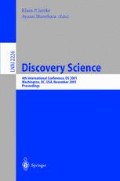Abstract
We consider the problem of pruning a given set of if-then rules, such that the support of the pruned rule set is not much less than the support of the given rule set. An empirical measure of similarity between two rules is introduced. This similarity measure is proportional to the degree of overlap between the support sets of the two rules. Using this similarity measure, we cluster the given rule set via the complete linkage algorithm. Rules within a cluster are approximate substitutes for each other and, as such, they can be replaced by a single rule, which is chosen to be the rule whose individual support value is the largest in the cluster. The pruning procedure is demonstrated on a set of rules generated from a marketing data set.
Access this chapter
Tax calculation will be finalised at checkout
Purchases are for personal use only
Preview
Unable to display preview. Download preview PDF.
References
Agrawal, R., Mannila, H., Srikant, R., Toivonen, H., Verkamo, A.I.: Fast Discovery of Association Rules. In Fayyad, U.M., Piatetsky-Shapiro, G., Smyth, P., Uthurusamy, R. (eds.): Advances in Knowledge Discovery and Data Mining. AAAI Press, Menlo Park, California (1996) 307–328
Han, J., Kamber, M.: Data Mining. Morgan Kaufmann, San Francisco, California (2001)
Hand, D.: Construction and Assessment of Classification Rules. Wiley, Chichester, England (1997)
Kohavi, R., Provost, F.: Applications of Data Mining to Electronic Commerce. In Data Mining and Knowledge Discovery, Vol. 5 (2001) 5–10
Lent, B., Swami. A., Widom, J.: Clustering Association Rules. In Proc. 1997 Int. Conf. Data Engineering (ICDE’97), Birmingham, England (1997) 220–231
Kaufman, L., Rousseeuw, P.J.: Finding Groups in Data: An Introduction to Cluster Analysis. Wiley, New York (1990)
Quinlan, J.R.: C4.5: Programs for Machine Learning. Morgan Kaufmann, San Mateo, California (1993)
Author information
Authors and Affiliations
Editor information
Editors and Affiliations
Rights and permissions
Copyright information
© 2001 Springer-Verlag Berlin Heidelberg
About this paper
Cite this paper
Lele, S., Golden, B., Ozga, K., Wasil, E. (2001). Clustering Rules Using Empirical Similarity of Support Sets. In: Jantke, K.P., Shinohara, A. (eds) Discovery Science. DS 2001. Lecture Notes in Computer Science(), vol 2226. Springer, Berlin, Heidelberg. https://doi.org/10.1007/3-540-45650-3_39
Download citation
DOI: https://doi.org/10.1007/3-540-45650-3_39
Published:
Publisher Name: Springer, Berlin, Heidelberg
Print ISBN: 978-3-540-42956-2
Online ISBN: 978-3-540-45650-6
eBook Packages: Springer Book Archive

